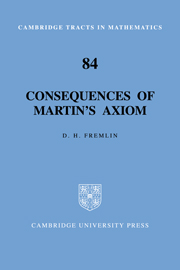Summary
I come at last to results which need the full strength of the cardinal m; that is to say, which involve partially ordered sets which are ccc but may not satisfy Knaster's condition. I divide these into two sections on combinatorics (§§41–42) and two on general topology (§§43–44).
Combinatorics I
I base this section on the result that if m > ω1 then every ccc partially ordered set satisfies Knaster's condition [41Ab]. This is already enough to prove that the product of ccc spaces is ccc [41E], so that Souslin's hypothesis is true [41D, 41F–G], and enables us to apply the results of §31 to ccc sets [41B–C]. I give a result in the partition calculus [41H] with some important corollaries. I conclude with a version of ‘Devlin's axiom’ [41K] and a description of some principles apparently weaker than m > ω1 [41L].
Theorem
[m > ω1] Let P be an upwards-ccc partially ordered set.
(a) If is a family in P, there is an uncountable A ξ ω1 such that {pξ:ξ∈A} is upwards-centered in P.
(b) P satisfies Knaster's condition upwards.
Proof (a) For ξ, < ω1 set
Qξ = {p:p∈P, ∃η≥ξ such that p ≥ pη}.
Then each Qξ is up-open in P, and Qξ ξ Qη whenever η ≤ ξ. Now there is a ζ < ω1 such that Qξ is cofinal with Qξ for every ξ ≥ ζ. P?
- Type
- Chapter
- Information
- Consequences of Martin's Axiom , pp. 174 - 231Publisher: Cambridge University PressPrint publication year: 1984



